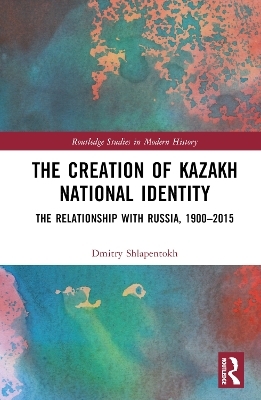
The Creation of Kazakh National Identity
Routledge (Verlag)
978-1-032-19614-5 (ISBN)
The book first explores the construction of Kazakh national identity and the ways in which intellectuals appealed to history to substantiate their claims about Kazakhstan’s future. Secondly, the narrative demonstrates that not all segments of totalitarian machinery work in unison. While terror reached its peak in the 1930s, cultural and ideological control was not as rigid as it would become in the late 1940s and early 1950s. Most importantly, the work is grounded in the study of the social universe. The book introduces the notion of “cosmos,” the peculiar connections between social, economic, and political forces. While not necessarily directly dependent on each other, they nevertheless created a unique interplay among the segments of societal structures and the state’s relationship with the wider universe. Taking this framework as the point of departure, this research analyzes Kazakhstan’s “multi-vectorism” as uniquely fit to contemporary global arrangements, when no global power dominates, and the lines between friend and foe are blurred.
This compelling approach to Kazakhstan’s history will appeal to postgraduate students and scholars in Russian history and world history.
Dmitry V. Shlapentokh was educated both in the USSR and the USA (Ph.D, University of Chicago). He is currently an associate professor of Russian and World History at Indiana University South Bend. His interests are in Soviet and post-Soviet history and European history. He has authored, co-authored, and edited several monographs: Ideological Seduction and Intellectuals in Putin’s Russia (2021); The French Revolution and the Anti-Democratic Tradition: A Case of False Consciousness (2018); The Mongol Conquest in the Novels of Vasily Yan: An Intellectual Biography (2017); Proto-Totalitarian State: Punishment and Control in Absolutist Regimes (2017); The French Revolution in Russian Intellectual Life; Societal Breakdown and the Rise of the Early Modern State in Europe: Memory of the Future (2015); The Role of Small States in the Post-Cold War Era: The Case of Belarus (2012); Russian Elite Image of Iran: From the Late Soviet Era to the Present (2009); Russia Between East and West: Scholarly Debates on Eurasianism (editor, 2007).
Introduction: Kazakhstan and Russia: The Case of “Multi-Vector” Policy in a Multi-Polar World 1. Theoretical Frameworks 2. Russian Orientalism and its European Pedigree 3. From Transethnic Eurasianism to “National-Bolshevism”: The Early Soviet Leaders’ Views of Soviet Minorities 4. The Birth of Kazakh Identity and its Historical Mythos: History of Kazakhstan as a Case Study 5. The Collapse of the USSR and the Immediate Aftermath 6. Decline of Eurasianism 7. Kazakhstan’s Relationship Regional Powers and the West 8. Friendship, Indifference, or Hostility: Kazakhstan and the Plans for Eurasian Union 9. Russia’s Imperial Venture and Implications for Kazakhstan 10. The Birth of the Eurasian Union and the Immediate Aftermath 11. Eurasian Union and the 550th Anniversary of Kazakhstan Statehood: Conflicting Narratives
| Erscheinungsdatum | 02.11.2023 |
|---|---|
| Reihe/Serie | Routledge Studies in Modern History |
| Verlagsort | London |
| Sprache | englisch |
| Maße | 156 x 234 mm |
| Gewicht | 453 g |
| Themenwelt | Geschichte ► Allgemeine Geschichte ► Neuzeit (bis 1918) |
| Geisteswissenschaften ► Geschichte ► Regional- / Ländergeschichte | |
| Geisteswissenschaften ► Philosophie | |
| Sozialwissenschaften ► Politik / Verwaltung ► Europäische / Internationale Politik | |
| Sozialwissenschaften ► Politik / Verwaltung ► Politische Systeme | |
| Sozialwissenschaften ► Politik / Verwaltung ► Politische Theorie | |
| Sozialwissenschaften ► Soziologie ► Spezielle Soziologien | |
| ISBN-10 | 1-032-19614-9 / 1032196149 |
| ISBN-13 | 978-1-032-19614-5 / 9781032196145 |
| Zustand | Neuware |
| Informationen gemäß Produktsicherheitsverordnung (GPSR) | |
| Haben Sie eine Frage zum Produkt? |
aus dem Bereich


